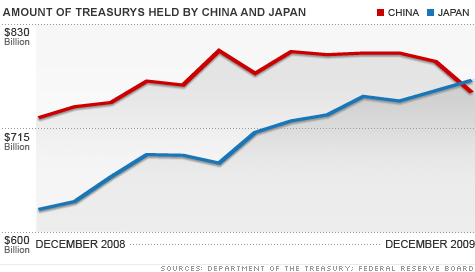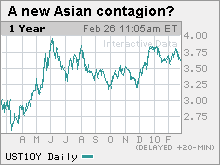 Japan's bond buying binge has helped to offset pressure from China reducing U.S. debt. But will Japan cool to Treasurys after Congress' treatment of Toyota?
Japan's bond buying binge has helped to offset pressure from China reducing U.S. debt. But will Japan cool to Treasurys after Congress' treatment of Toyota?NEW YORK (CNNMoney.com) -- China is one of the largest holders of U.S. Treasurys. So some worry that our massive budget deficit, which China has vocally complained about, is the equivalent of biting the hand that feeds us.
Notice though that I said that China is one of our largest creditors, not the largest. That honor now goes to Japan, which surpassed China according to the most recently available data from the Treasury Department.

 |
| So far, long-term interest rates remain low. But some fear that selling (or a lack of buying) from Japan and China could lead to a big spike in U.S. 10-Year Treasury yields. |
Up until last month, you'd think there was no need to worry about angering the Japanese. But now that our best and brightest in Congress have done a wonderful job of verbally undressing the CEO of Toyota Motor (TM) in front of the entire world, are we biting the other hand that feeds us?
"We have to be the dumbest borrower around. It's pretty remarkable. We don't want to alienate Japan," said Haag Sherman, managing director with Salient Partners, an investment firm in Houston.
Japan held approximately $768.8 billion in U.S. Treasurys as of December and China owned $755.4 billion. Those numbers were just released last week. Given the lag in when Treasury reports foreign holdings, we won't know what Japan and China did in February until mid-April.
So far, there doesn't seem to be any evidence that Japan (or anyone else for that matter) is unloading Treasurys. There has actually been heavy buying interest for the U.S. 10-year Treasury this week, pushing the yield on this benchmark down to 3.62% from 3.8%. (Bond prices and rates move in opposite directions.)
Still, the U.S. might want to tread carefully in its future treatment of Toyota. The fact that Japan has been a steady buyer of our debt at a time when China has been unwinding some of its Treasurys has arguably helped keep long-term rates from shooting higher.
Federal Reserve chairman Ben Bernanke stressed once again earlier this week that he thinks short-term interest rates should remain low. He'll have a major problem though if Japan and China cool to Treasurys and that allows long-term rates to shoot up. Just do the math.
"$750 million times 2 is a much bigger problem than $750 million times 1," said Keith McCullough, CEO and founder of New Haven, Conn.-based investment research firm Hedgeye Risk Management, about the possibility of our two biggest creditors losing interest in our debt. "It won't matter if Bernanke doesn't want to raise rates. The market may do it for him."
And the last thing the U.S. economy needs right now is a sudden jump in long-term rates, since that could have the potential to cause a spike in mortgage rates and do further damage to the housing market.
Japan may not necessarily need to sell Treasurys to cause a jump in interest rates. It could simply buy less -- or stop buying altogether.
"If you think the U.S. inspired the Japanese to buy more Treasurys in February you must not be able to hear or see," said McCullough.
Of course, this is not to say that U.S. politicians should treat Toyota with kid gloves. It goes without saying that the American people have a right to find out what Toyota is doing to solve the many problems in its cars and trucks.
Sherman said that Japan's government probably realizes this and would not do anything rash with its Treasury holdings even if it does not like how our lawmakers treated Akio Toyoda.
"I think the Japanese have a much bigger picture view of things and understand the U.S. is a great export market for Toyota and other Japanese companies," he said.
That's probably true. But the bigger issue is that the U.S. is heavily reliant on other countries to subsidize the federal government's spending.
Sure, the U.S. has lucked out lately. Europe's financial problems make our fiscal challenges look tame in comparison. That means that even if the Chinese and Japanese aren't thrilled with the U.S., a dollar-denominated asset is probably a heck of a lot more attractive than anything tied to the euro.
"The euro no longer feels like a good trade. Foreign central banks have to feel queasy about aggressive allocation to the euro at this point," said Jonathan Lewis, chairman of the investing committee with Samson Capital Advisors, a fixed income and currency investment management firm in New York.
What's more, any signal by Japan or China that they are dumping Treasurys would only serve to hurt the Japanese in addition to the U.S. That's because fixed income investors could panic and the selling would lead rates to shoot higher, which isn't what Japan ultimately wants.
"Any retaliatory move could be disastrous and cause massive sell-off. Japan, or China for that matter, is not going to put a gun to our head and theirs next to it," Sherman said.
But someone has to absorb the massive supply of Treasurys we keep pumping on to the market. Why risk unnecessarily ticking off two of the parties that have been among the biggest buyers?
"People should be permanently concerned about large foreign holdings of Treasurys. We are depending on the kindness of strangers like Blanche DuBois in 'A Streetcar Named Desire' and that doesn't always work out," Lewis said.
Reader comment of the week: Wal-Mart's acquisition of online video company Vudu could be the deal that finally puts the company over the hump in digital media. But I don't think that's the case. The competition is brutal -- on both the high end and low end of the market. Doug Walsh agrees.
"I think what Wal-Mart may not be taking into account is that the households most likely to be buying broadband-capable HDTV's and Blu-Ray players are also the same homes that very likely already have a PS3 or Xbox 360 loaded up with Netflix's digital distribution software." he wrote.
"As for DVD's, I stream everything these days and only get DVDs for stuff that Netflix and ZuneHD don't offer digitally yet -- but, that said, there is almost always a line of 3 or 4 people at the grocery store waiting to use the Redbox kiosk!"
-- The opinions expressed in this commentary are solely those of Paul R. La Monica. ![]()



| Overnight Avg Rate | Latest | Change | Last Week |
|---|---|---|---|
| 30 yr fixed | 3.80% | 3.88% | |
| 15 yr fixed | 3.20% | 3.23% | |
| 5/1 ARM | 3.84% | 3.88% | |
| 30 yr refi | 3.82% | 3.93% | |
| 15 yr refi | 3.20% | 3.23% |
Today's featured rates:



| Index | Last | Change | % Change |
|---|---|---|---|
| Dow | 32,627.97 | -234.33 | -0.71% |
| Nasdaq | 13,215.24 | 99.07 | 0.76% |
| S&P 500 | 3,913.10 | -2.36 | -0.06% |
| Treasuries | 1.73 | 0.00 | 0.12% |
| Company | Price | Change | % Change |
|---|---|---|---|
| Ford Motor Co | 8.29 | 0.05 | 0.61% |
| Advanced Micro Devic... | 54.59 | 0.70 | 1.30% |
| Cisco Systems Inc | 47.49 | -2.44 | -4.89% |
| General Electric Co | 13.00 | -0.16 | -1.22% |
| Kraft Heinz Co | 27.84 | -2.20 | -7.32% |
|
Bankrupt toy retailer tells bankruptcy court it is looking at possibly reviving the Toys 'R' Us and Babies 'R' Us brands. More |
Land O'Lakes CEO Beth Ford charts her career path, from her first job to becoming the first openly gay CEO at a Fortune 500 company in an interview with CNN's Boss Files. More |
Honda and General Motors are creating a new generation of fully autonomous vehicles. More |
In 1998, Ntsiki Biyela won a scholarship to study wine making. Now she's about to launch her own brand. More |
Whether you hedge inflation or look for a return that outpaces inflation, here's how to prepare. More |